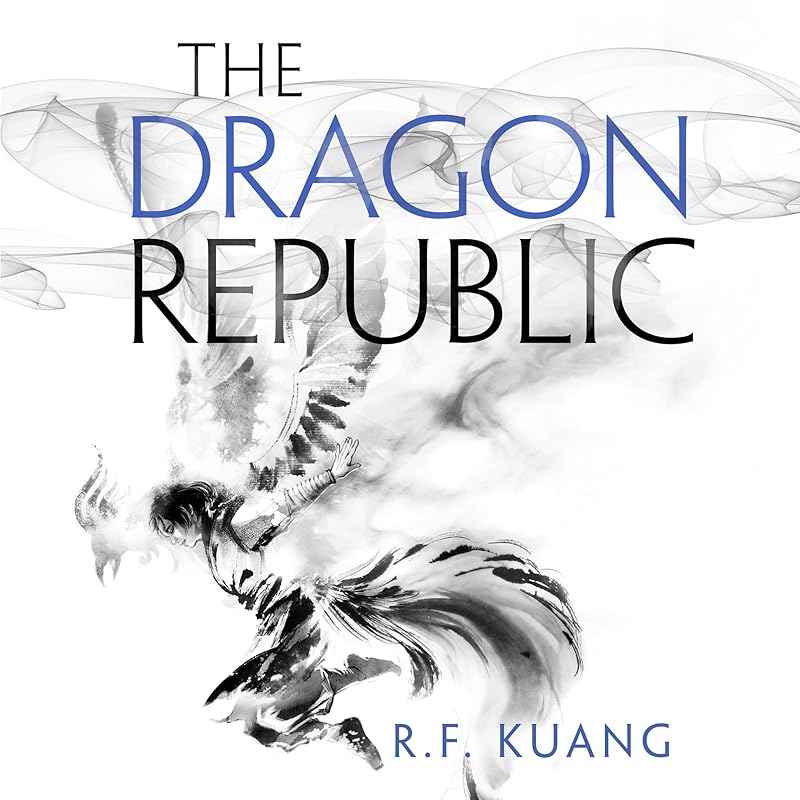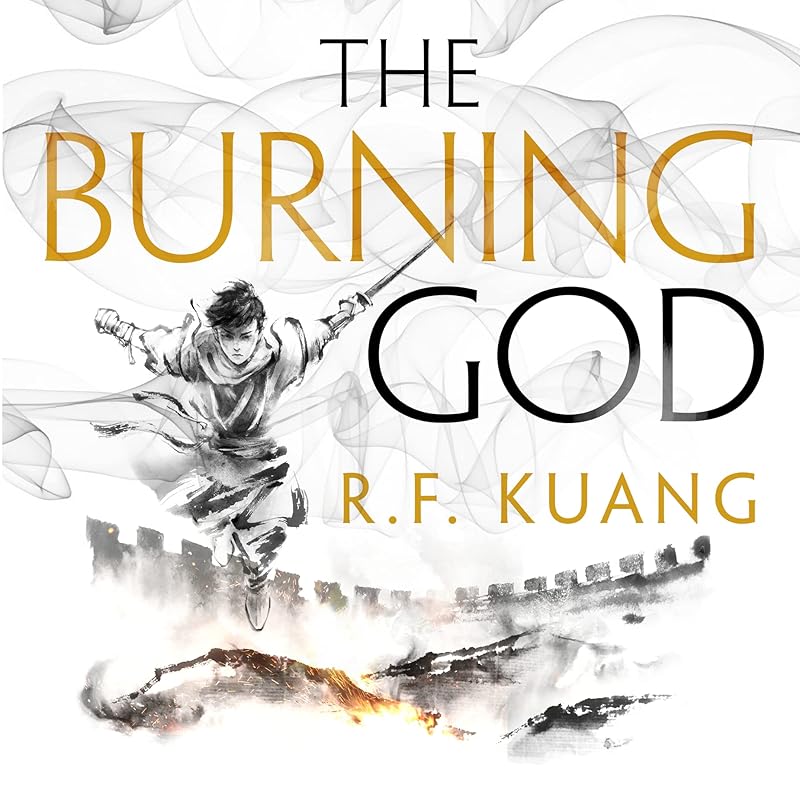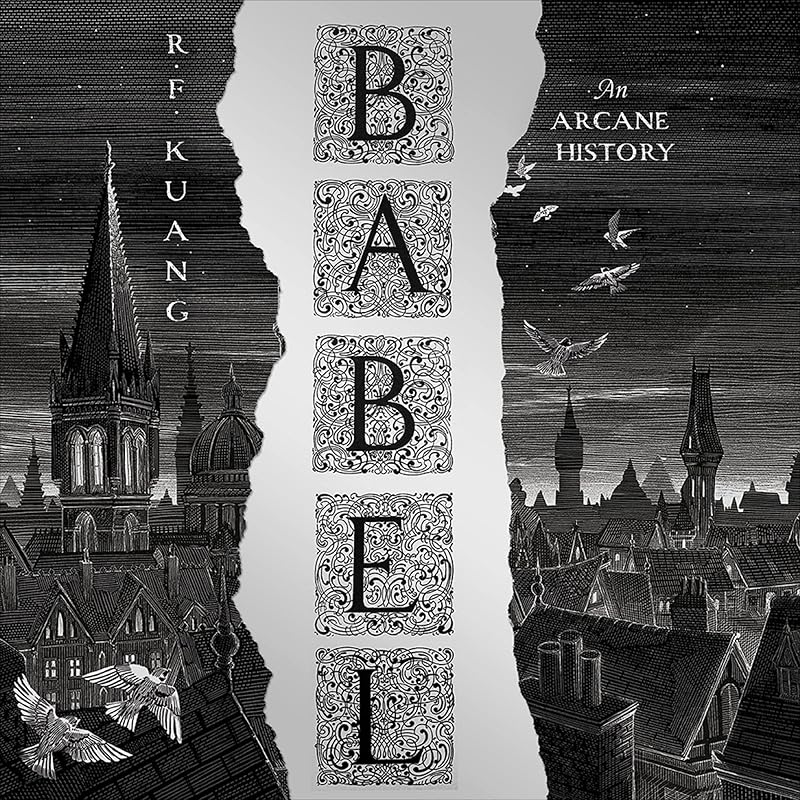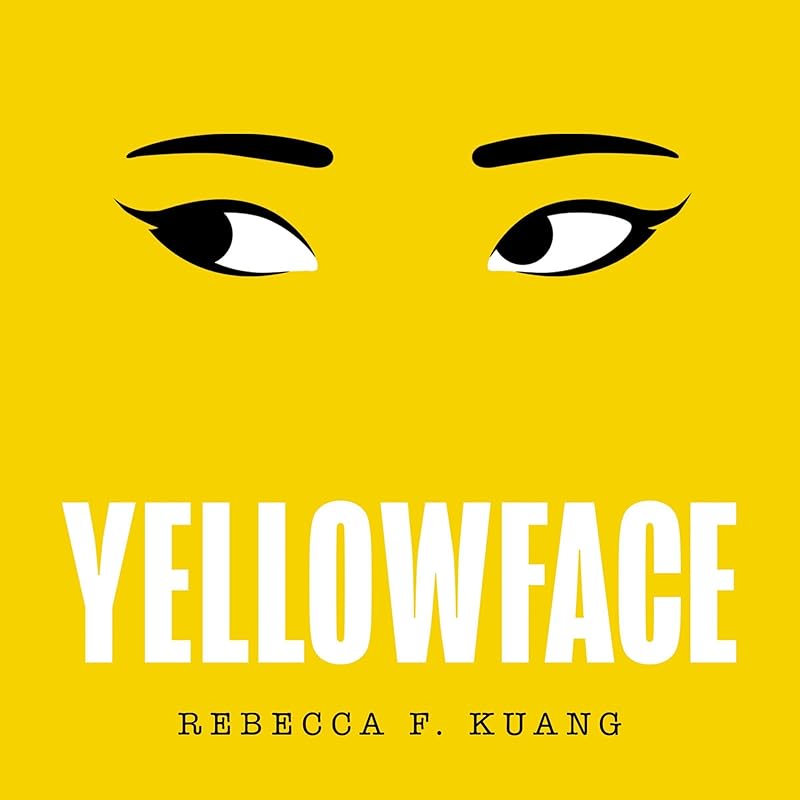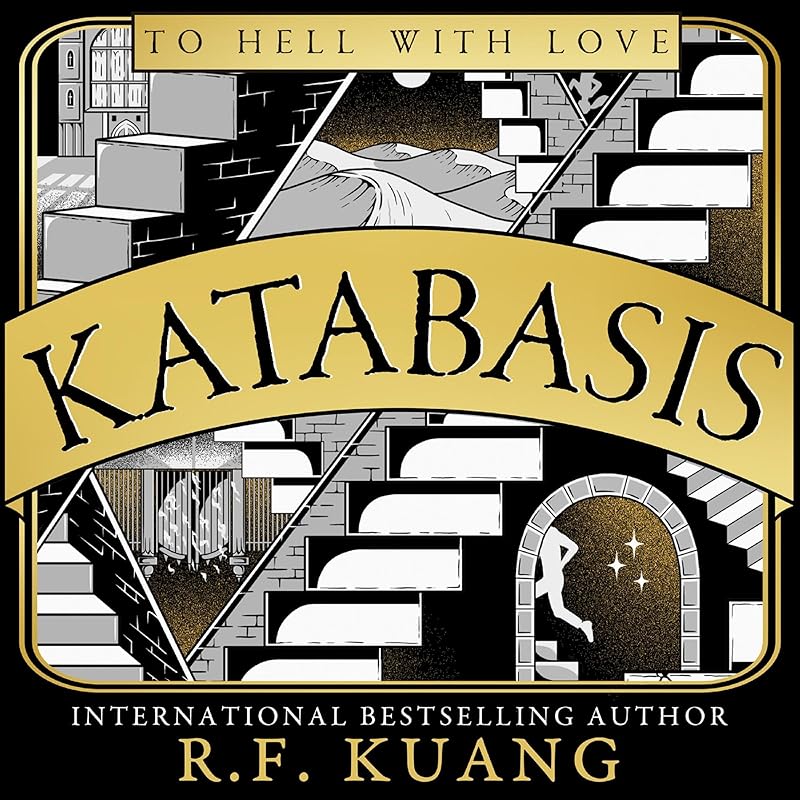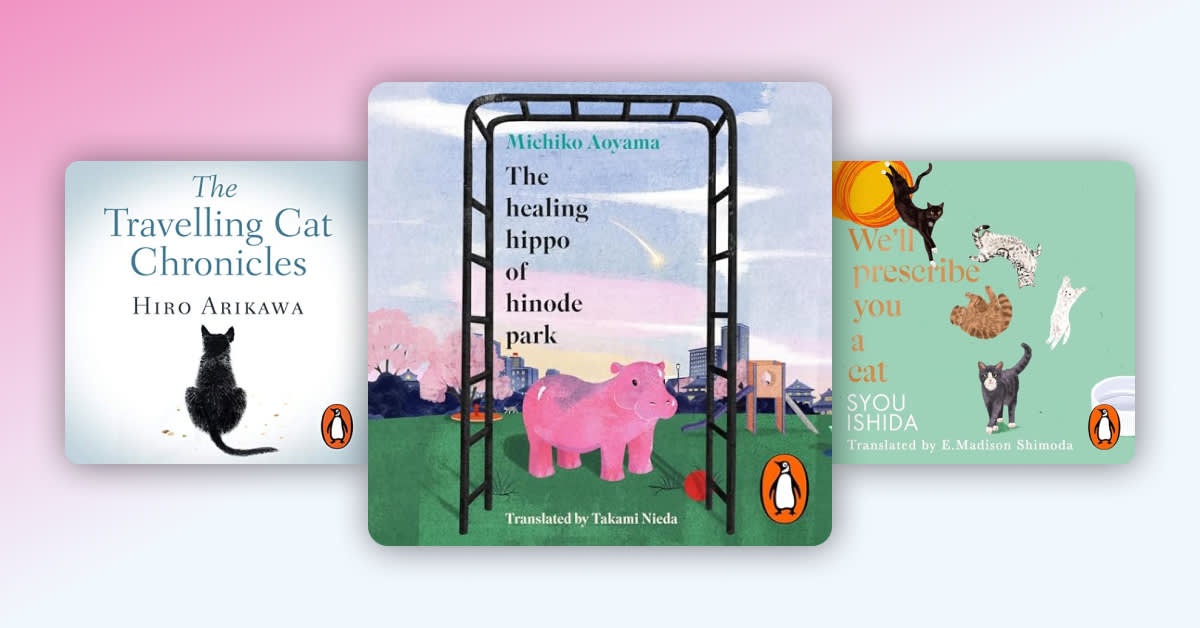This post was originally published on Audible.com.
Since her debut with The Poppy War, R.F. Kuang has proven herself to be one of the most compelling storytellers of our time. Her novels are expansive, genre-bending and unflinching. Whether she's writing about war, empire, language or the publishing industry itself, Kuang does not just build worlds—she asks what it costs to live in them, and what we are willing to sacrifice to survive.
Across five novels, she's taken readers from the battlegrounds of the fictional empire of Nikara to the halls of Oxford University, from social satire set inside the publishing machine to the literal depths of Hell itself. Each story feels different, but together they chart an unmistakable trajectory: sharp, fearless, and unforgettable.
This guide breaks down every title—The Poppy War, The Dragon Republic, The Burning God, Babel, Yellowface and Katabasis—to help you revisit each story or catch up before diving into the next.
Warning: There will be spoilers!
The Poppy War
When war orphan Fang Runin—who goes by the nickname Rin—tests into the prestigious Sinegard Military Academy, no one expects her to survive. Born in the southern provinces of Nikara and raised by opium smugglers who only adopted her to exploit her labor, Rin isn’t supposed to have options, let alone ambition. When she passes with top scores, she earns a place among the empire’s elite.
At Sinegard, Rin quickly realises that winning admission doesn’t mean she belongs. She’s poor, dark-skinned and female in a school that sees all three as weaknesses. She’s mocked by wealthy, upper-class students from the north, like her cruel rival Nezha, and underestimated by professors. Her pain tolerance, fueled by years of abuse and deprivation, becomes one of her greatest strengths. So does her rage.
In her second year, Rin begins training under Master Jiang, a seemingly erratic lorekeeper who teaches her meditation, myth and the shamanic traditions of the long-buried Speerly race. Through him, Rin begins to connect with the Phoenix god, an ancient, fire-wielding deity that offers her terrifying power in exchange for total submission. She learns to call the fire, but not to control it. And once the Phoenix opens the door, it won’t easily close again.
While Rin grapples with her own potential for destruction, war breaks out between the Nikara Empire and the neighboring Federation of Mugen. The long-dormant conflict erupts into unspeakable violence, and Rin is deployed with a special unit of battle shamans known as the Cike. This military unit of magic users is led by Altan, her Speerly commander, and the only other person alive who can commune with the Phoenix.
Altan and Rin share more than just a bond with fire. Both are fueled by generational trauma and the need to reclaim agency over a world that has brutalized them. But Altan’s rage is consuming, and Rin begins to see what her own future could look like if she follows him too closely.
At the end of The Poppy War, Rin becomes the thing she feared. With Altan dead and the Phoenix fully awakened inside her, she obliterates the Federation’s island stronghold in an act of revenge. Thousands die in flame. And the war is far from over.
Poppy War quotes:
“Great danger accompanies great power.” —Jiang
“The gods are not good, but they are powerful.” —Jiang
“I don’t want to be a weapon, but I don’t have a choice.” —Rin
“When you are at war, you do not have the luxury of being good.” —Altan
The Dragon Republic
Haunted by the atrocities she committed on Federation of Mugen’s crescent-shaped island, Rin emerges from Golyn Niis scarred, addicted to opium and tethered to the Phoenix god, whose fire destroyed an entire population of people. Altan is dead, but his voice and fury linger inside her. She is consumed by guilt, rage and a desperate need for vengeance against the Empress Su Daji, whose betrayal cost her adopted homeland, Nikan, everything.
Rin joins forces with the Dragon Warlord Yin Vaisra, who promises to overthrow Daji and build a new Dragon Republic. He gives Rin and the Cike a place in his campaign and, for the first time, Rin imagines a future beyond survival. But Vaisra is a calculating leader, more interested in strategy and power than in Rin’s pain. He values her fire as a weapon but demands her obedience, forcing her to question whether his vision of a republic is truly hers.
At the same time, Rin’s bond with Nezha shifts from rivalry to uneasy alliance. Fighting at his side reveals unexpected loyalty and intimacy, but also deep divisions. Nezha’s family legacy, his own shamanic powers and his loyalty to Vaisra complicate their fragile trust. Rin struggles to reconcile her growing attachment to him with her determination to follow Altan’s path of relentless fire.
The war for Nikan spirals into brutal battles across land and sea. Rin learns more about her power from the Trifecta, three legendary shamans whose fractured loyalties and ancient grudges mirror her own descent. The Phoenix continues to demand her submission, whispering promises of strength if she will only surrender completely. Every choice brings Rin closer to becoming the monster she fears, even as she clings to the idea that she can wield fire for justice.
When Vaisra’s true ambitions are revealed, Rin is forced to confront betrayal yet again. His republic is not built on freedom but on control, and he never saw her as an equal. In the book’s devastating climax, Rin chooses fire once more, turning against Vaisra and reshaping the future of Nikan in blood.
Rin began as an orphan, then became a soldier, then a weapon. In The Dragon Republic, she begins to confront what it means to lead, and what it costs to claim power in a world built on ashes.
The Dragon Republic quotes:
“You cannot seek justice without war.” —Rin
“If you hold the weapon, you have the power.” —Altan (in Rin’s memory)
“We are the only ones who will fight for our people.” —Rin
“They don’t want to civilise us. They want to conquer us.” —Kitay
The Burning God
Rin has turned against the Dragon Warlord’s vision of a republic and claimed command of the Southern Coalition, a ragtag army of peasants and warlords who see her as both liberator and fire-wielding goddess. Betrayed by Vaisra and haunted by the Phoenix, Rin embraces the role of a warlord in her own right, determined to destroy the Empress Su Daji once and for all.
But victory is never simple. Daji’s forces are fractured, yet she remains a cunning opponent, bound to her own god of death. The fight for Nikan splinters into endless campaigns, shifting alliances and the ever-present threat of foreign intervention. Rin commands fire with terrifying ease, but the Phoenix grows louder, demanding total submission. Each battle costs Rin more of her humanity as she weighs the destruction of cities and thousands of lives against the survival of her people.
Nezha, now her greatest rival, rises as the leader of the Dragon Republic’s forces. Bound by loyalty to his father and carrying the god of the Dragon within him, he becomes the one commander who can match Rin in power and strategy. Their shared history—once bitter rivalry, then fragile alliance—collapses into a cycle of betrayal and brutal combat. Yet even in their enmity, they remain tied by understanding that only they can grasp.
As famine spreads and the empire crumbles, Rin realises that no political order—monarchy, republic or coalition— can save Nikan. Only overwhelming force can decide its future. The Phoenix god urges her to burn everything to ash, to remake the world from ruin. Rin, exhausted by war and grief, begins to believe that destruction might be mercy.
In the end, Rin chooses fire not only for her enemies, but for herself. Refusing to be controlled by Nezha, by the Phoenix or by any empire, she demands her own death, leaving Nezha with the power to rebuild from what remains. Her sacrifice ends her story as it began: a war orphan who seized power at any cost, and who became the Speerly weapon that history will never forget. The Burning God closes Rin’s journey in devastation and flame, cementing her as both saviour and destroyer of Nikan.
The Burning God quotes:
“I am the burning god. I will not be controlled.” —Rin
“They only care about peace when it serves their power.” —Kitay
“History will remember you as a tyrant. But I will remember you as my friend.” —Kitay
“Power is not something you are given. It’s something you take.” —Rin
Babel
A boy from Canton, China, is orphaned by a cholera outbreak and taken in by the enigmatic Professor Richard Lovell. Renamed Robin Swift, he is brought to England and raised to master Latin, Greek and Chinese. His language training is designed for one purpose: entry into the University of Oxford’s Royal Institute of Translation, known as Babel.
Babel is the British empire’s jewel. Its translators wield silver-working, a magical process that harnesses the gaps between languages to create enchanted bars of silver capable of healing, fortifying and powering industry. Translation sustains the British Empire’s global dominance, and students at Babel are trained both as scholars and as instruments of empire. For Robin, the Institute is paradise, a place of books, learning and belonging, where he forges bonds with fellow students Ramy, Victoire and Letty. Together, they are the most-gifted cohort Babel has ever seen.
Yet paradise comes at a cost. Robin quickly realises that Babel’s magic serves only one master: imperial power. The silver bars enrich Britain while exploiting colonies, draining people and lands abroad in the name of progress. When Robin learns the truth of his own father—the Englishman who abandoned his mother and orchestrated his adoption—he begins to see Babel not as a sanctuary, but as a cage.
Drawn into the underground Hermes Society, Robin and his friends confront the contradictions of their lives. They love Babel and each other, but they cannot ignore the violence Babel perpetuates. Betrayal fractures their fellowship, and loyalty to empire is tested against loyalty to justice. When peaceful resistance proves impossible, Robin makes an irrevocable choice: to weaponize Babel itself.
Robin turns translation into rebellion, sacrificing himself to bring down the tower that gave him everything and took just as much away.
Babel quotes:
“Translation is always an act of betrayal.” —Professor Lovell
“Violence is the only language they understand.” —Robin
“Who else is going to save us, if not us?” —Victoire
“Power doesn’t care about being right. It only cares about being believed.” —Ramy
Yellowface
June Hayward and Athena Liu graduate from Yale University in the same year, but their careers could not be more different. Athena becomes a literary darling, celebrated for her talent, her beauty and her identity as a Chinese American author writing about war, history and identity. June, who describes herself as a “plain, straight white girl from Philly,” struggles in obscurity, her debut ignored and her ambitions quietly curdling into envy.
One night, everything changes. Athena dies suddenly in a freak accident, and June, alone in the apartment with her, sees the unfinished manuscript Athena has left behind. A sweeping novel about Chinese labourers in World War I, it's written with the depth and brilliance June has never managed. In a moment of impulse, she takes it.
Revising and polishing Athena’s draft, June publishes it as her own. She shortens her name to Juniper Song—ambiguous, racially unplaceable—and basks in the acclaim she's always longed for. Critics and readers hail her as a bold new voice, and her career soars. But the higher she rises, the sharper the questions become. Why did Athena never speak of this project? Why does Juniper Song look so different in person than readers imagined? And how far will June go to defend a lie built on theft?
As the pressure mounts, June’s narrative begins to crack. Online critics, watchdog readers and Athena’s friends and family circle ever closer. What begins as envy spirals into paranoia, desperation and self-destruction. June insists she is the victim—that she worked just as hard, that she deserves the success denied to her. But the truth cannot stay buried forever. Haunted by hallucinations of Athena, June refuses to admit wrongdoing, even as her world collapses. By the end, even after being caught, she doubles down and begins writing another book under her pseudonym, unapologetically rewriting history once again.
Yellowface quotes:
“The only reason you’re allowed to succeed is because I died.” —Athena Liu (hallucination)
“Publishing is a popularity contest dressed up as meritocracy.” —June Hayward
“She has all the right opinions, but she’s not burdened by actually having lived them.” —June
“Publishing doesn’t reward good books. It rewards books that make people feel good about themselves.” —June
Katabasis
Alice Law has staked everything on her future as a magician at the University of Cambridge. Brilliant, ambitious and desperate for recognition, she studies under Professor Jacob Grimes—the most powerful figure in analytic magick. But Grimes is careless. He lets students do his work, takes credit for their results, and he never bothers to double-check. When Alice, exhausted and frantic for his approval, makes a mistake in a pentagram, the experiment explodes. Grimes dies horribly, and although the university calls it an accident, Alice knows the truth: She killed him.
Without Grimes, she has no advisor, no future in the field and no hope of the career to which she's devoted her life. So she decides to do the unthinkable—descend into Hell and bring him back. Peter Murdoch, her brilliant and infuriating classmate, intercepts her summoning circle and insists on joining her. Together, they cross into the Eight Courts of Hell, where logic and paradox shape reality.
In Asphodel, they meet the Shades of Grimes’s former students, killed years earlier in another “accident.” These lost undergraduates confirm that Grimes passed through recently, moving deeper into the courts with purpose. Alice and Peter follow, scaling a vast wall of bone to bypass the endless queues of souls, navigating landscapes that shift like optical illusions, and passing through libraries where scholars of the dead debate eternity. They face trials set by guardians of the courts, including the Weaver Girl, whose riddling test nearly kills Peter before the Shade Elspeth intervenes.
Elspeth, once a prodigy who studied under Grimes before taking her own life, ferries them onward in her boat. With her, Alice confronts the despair and corruption of academia that drove Elspeth to suicide, even as she clings to her own need for achievement. But when Elspeth realizes they lied about their purpose, she casts them off. Alone, Alice and Peter stumble into a trap laid by Nick and Magnolia Kripkes, a husband-and-wife duo who slit their own throats and poisoned their son to descend into Hell as an experiment. Commanding bone constructs and hungry for power, the Kripkes nearly destroy them. Peter sacrifices himself so Alice can escape, forcing her forward in fury and grief.
Lost and hunted, Alice inhales magickal chalk at the urging of a Shade. The power sharpens her casting, fueling her with terrible clarity. She springs her own paradoxes and traps against the Kripkes, turning their constructs to dust. Nick Kripkes falls by her hand, and when Magnolia and their son, Theophrastus, break free, they choose the Lethe together, dissolving into the river’s oblivion.
Still, Alice presses deeper. She reaches the courts where souls transform into trees, rejects the Rebel Citadel of static scholars and finally comes before Lord Yama himself, armed with the contradiction plant Elspeth entrusted to her. When Lord Yama finds out that Alice is looking for Grimes, he summons him—and Alice at last sees her professor again. But Grimes, unchanged even in death, tries to claim her journey as his own achievement. He urges her to stay in Hell with him, to devote herself eternally to his vision. Alice sees him clearly for what he is: selfish, manipulative and unworthy of the devotion that has consumed her life. Alice refuses him. With the contradiction plant and Peter’s exchange pentagram, her bargain with Lord Yama is sealed: The one she loves will be returned. Yama honors the deal, but not in the way Alice once thought. Peter is restored to her, and Grimes dissolves into nothing. Alice is left with Peter—alive. Together, they step back into the world of the living, saying goodbye to Hell, and planning their future together.
Katabasis quotes:
“You are not unkillable. You are just not finished.” —Elspeth
“It was easier to call it fiction. Easier than admitting it happened.” —Alice
“The worst part of being dead is having to remember everything.” —Alice
“You keep asking for permission to exist. Just exist.” —Peter
“You’d think more often it’d be the man. But it’s always the girl. She’s always afraid. She wants to believe him, but she can’t. He’s let her down too many times in the past. She knows he’ll do it again. And in the end, she has to look out for herself.” —The Weaver Girl
“Hell’s lonely...You’ll want company.” —Peter
“Hell is other people, I’ve heard.” —Alice
Adaptations
• The Poppy War trilogy: Optioned for television by Starlight Media and SA Inc. as of December 2020; currently remains in development.
• Babel: Screen rights sold to Wiip Studios for adaptation, with Temple Hill Entertainment producing.
• Yellowface: Being developed as a television series, with Karyn Kusama attached to direct.
• Katabasis: In development as a Prime Video series by Amazon MGM Studios; Angela Kang (The Walking Dead) is attached as writer-showrunner, and both she and Kuang serve as executive producers.
About the Author
Rebecca F. Kuang is a #1 New York Times bestselling author—along with being Hugo, Nebula, Locus and World Fantasy Award-nominated—known for her bestselling novels Babel and Yellowface and the award-winning Poppy War trilogy. She is a Marshall Scholar, translator and has an MPhil in Chinese Studies from the University of Cambridge and an MSc in Contemporary Chinese Studies from the University of Oxford. She is now pursuing a PhD in East Asian Languages and Literatures at Yale University.
About the Performers
Emily Woo Zeller: Listed as one of AudioFile’s "Best Voices" in 2015 and 2013, Audie, Earphones and SOVAS award-winning actor. Her work includes years of animation dubbing and stage performances as a dancer, singer,and actor. She won a Tristan Award for her work as Sally Bowles in Cabaret and a Roselyn E. Schneider Prize for Creative Achievement. Her acclaimed audiobook work includes narrating Fire Road by Kim Phuc Phan Thi, The Life-Changing Magic of Tidying Up by Marie Kondo, Gulp by Mary Roach and The Poppy War by R. F. Kuang.
Chris Lew Kum Hoi is known for War Machine (2017), Eurovision Song Contest: The Story of Fire Saga (2020) and Jayson Bend: Queen and Country (2015).
Billie Fulford-Brown was born in Chichester, West Sussex, and she went to school in Portsmouth, Hampshire. She has a degree from Sheffield University and now lives in London. Billie is known for Somatic (2016), Cold Call (2015), Sofia's Diary (Sony Picture, 2009) and for playing Ruth Ellis in Fred Dinenage, Murder Casebook (Sky, 2011)
Helen Laser is a New York City-based voice actor and artist. Helen narrates for Audible, Apple News+, Penguin Random House and is the voice of Annie's Homegrown. She has appeared on television, in award-winning films that have graced the festival circuit worldwide and in various stage performances. She is a member of SAG-AFTRA, a published writer, appreciator of all things spooky, and she likes to paint. She plays various instruments, including autoharp, accordion, ukulele and clarinet.
Morag Sims is known for Robot Overlords (2014), Scrawl (2015) and The Turners (2016).
Will M. Watt is a New York City-based male British voiceover artist.


